
JOURNAL OF PHILOSOPHICAL LOGIC
metrics 2024
Pioneering New Perspectives in Logical Theory
Introduction
The JOURNAL OF PHILOSOPHICAL LOGIC, published by Springer, is a prestigious scholarly journal specializing in the intricate intersections of logic, philosophy, and their diverse applications. Since its inception in 1972, this eminent journal has become a cornerstone of philosophical discourse, attracting leading researchers and scholars in the field. With an impressive ranking of #77 out of 806 in the Scopus Arts and Humanities - Philosophy category and being positioned in the top 10th percentile, it stands as a Q1 journal, denoting its significant impact and rigorous standards in academic publishing. Although not an Open Access journal, it offers access to a wealth of high-quality articles contributing to the advancement of logical theory and practice until 2024. The journal aims to foster a vibrant platform for the exploration and development of philosophical logic, encouraging groundbreaking research and innovative dialogue among professionals and students alike, and solidifying its role as an essential resource within the philosophical community.
Metrics 2024
 0.93
0.93 0.70
0.70 1.00
1.00 47
47Metrics History
Rank 2024
Scopus
JCI (Web Of Science)
Quartile History
Similar Journals

JOURNAL OF LOGIC AND COMPUTATION
Unraveling Complexities in Logic and ComputationJOURNAL OF LOGIC AND COMPUTATION, published by Oxford University Press, is a leading peer-reviewed journal dedicated to advancing research in the intersections of logic, computation, and theoretical frameworks of computer science. With an ISSN of 0955-792X and an E-ISSN of 1465-363X, the journal has established itself within academic circles, boasting significant impact evidenced by its category quartiles, including a Q1 ranking in Arts and Humanities (miscellaneous) and a Q2 in Logic for 2023. This prestigious journal emphasizes interdisciplinary approaches to understanding computational systems, hence targeting a diverse audience of researchers, professionals, and students keen on exploring provocative questions in logic and computation. Although not open access, the content is highly valuable, reflecting contemporary challenges and advancements in the field. With over three decades of published work, spanning from 1990 to 2024, the journal continues to contribute richly to the discourse surrounding logical methodologies and computational innovations, making it an essential resource for those engaged in these dynamic areas of study.
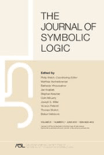
JOURNAL OF SYMBOLIC LOGIC
Fostering Scholarly Discourse in Logic and PhilosophyThe JOURNAL OF SYMBOLIC LOGIC, published by Cambridge University Press, stands as a leading platform for scholarly discourse in the realms of logic and philosophy. With a rich history dating back to 1938, this esteemed journal is dedicated to presenting cutting-edge research that pushes the boundaries of knowledge within symbolic logic and its applications. In 2023, it proudly holds a distinguished Q1 ranking in both Logic and Philosophy categories, reflecting its high impact and relevance in the academic community. Researchers and academics benefit from its rigorous peer-review process and contributions from leading scholars worldwide, ensuring the dissemination of high-quality research and critical theories. While the journal currently does not operate under an open access model, it remains a pivotal resource for professionals seeking to deepen their understanding of logical theories and philosophical inquiries. Explore the JOURNAL OF SYMBOLIC LOGIC to engage with scholarly articles that challenge conventional thought and inspire future research.
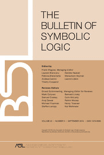
BULLETIN OF SYMBOLIC LOGIC
Exploring the Depths of Symbolic ThoughtBULLETIN OF SYMBOLIC LOGIC, published by Cambridge University Press, is a distinguished academic journal that serves as an essential platform for the dissemination of research in the realms of logic and philosophy. Since its inception in 1995, this journal has progressed through its convergence years and remains committed to fostering intellectual discourse among scholars. With a 2023 ranking in the Q1 category of Philosophy and a Q3 classification in Logic, it continues to uphold its reputation as a significant contributor to the field. While operating under a traditional subscription model, the journal dedicates itself to publishing high-quality articles that explore foundational issues, advanced theories, and innovative insights in symbolic logic. Researchers, professionals, and students will find invaluable resources within its pages, particularly as it ranks favorably among peers, with noteworthy standings in Scopus rankings. For those seeking to deepen their understanding of logical frameworks and their philosophical implications, BULLETIN OF SYMBOLIC LOGIC is an indispensable resource.
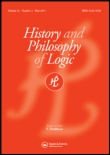
HISTORY AND PHILOSOPHY OF LOGIC
Connecting Historical Contexts with Logical ThoughtHISTORY AND PHILOSOPHY OF LOGIC is a prestigious journal published by Taylor & Francis Ltd, focusing on the intricate relationships between historical contexts and philosophical inquiries within the realm of logic. With its ISSN 0144-5340 and E-ISSN 1464-5149, the journal has established itself as a vital academic resource since its inception in 1980 and will continue to contribute to the field until 2024. It holds an impressive status, ranking in the Q1 category in History and Q2 in History and Philosophy of Science according to the 2023 category quartiles. This journal is recognized for its high-impact research, achieving notable positions in Scopus ranks, including 80th percentile in Arts and Humanities - History and 58th percentile in History and Philosophy of Science. Although it does not offer open access, it remains a crucial platform for scholars, researchers, and students aiming to explore and advance knowledge at the intersection of logic's history and its philosophical implications.
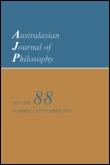
AUSTRALASIAN JOURNAL OF PHILOSOPHY
Advancing Knowledge Through Critical AnalysisAustralasian Journal of Philosophy, published by Routledge Journals, Taylor & Francis Ltd, serves as a premier platform for scholarly discourse in the field of Philosophy. With its origins dating back to 1947, this esteemed journal maintains a rich tradition of fostering high-quality, peer-reviewed research and is recognized for its significant contribution to the philosophy community. Holding a distinguished Q1 ranking in the field for 2023 and standing at #75 out of 806 in the Scopus Arts and Humanities ranking, it occupies a vital niche in advancing philosophical knowledge and inquiry. Although the journal is not open access, it periodically offers articles that contribute to the dissemination of philosophical thought, making it a valuable resource for researchers, professionals, and students alike. The AUSTRALASIAN JOURNAL OF PHILOSOPHY continues to inspire and challenge thinkers worldwide as it presents critical analyses, innovative ideas, and rigorous arguments, ensuring its relevance and importance in contemporary philosophical discussions.
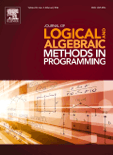
Journal of Logical and Algebraic Methods in Programming
Unlocking New Frontiers in Programming Logic and Methodologies.The Journal of Logical and Algebraic Methods in Programming (ISSN: 2352-2208, E-ISSN: 2352-2216) is a prestigious publication by Elsevier Science Inc, dedicated to advancing the fields of computational theory, programming logic, and mathematical methodologies. Esteemed in its commitment to high-quality research, this journal holds a Q2 ranking in 2023 for Computational Theory and Mathematics, and is recognized in various other disciplines including Logic and Software Studies. The journal’s open access policy enhances its visibility and accessibility, ensuring that cutting-edge research reaches a wider audience of researchers, professionals, and students. With an impressive convergence timeline from 2014 to 2025, it is a vital resource for those seeking to explore innovative algorithms and their applications in diverse areas of informatics. The Journal of Logical and Algebraic Methods in Programming represents a unique intersection of logic, mathematics, and software, carving a significant place in the scholarly discourse of theoretical computer science.
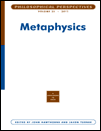
Philosophical Perspectives
Fostering critical perspectives for a brighter intellectual future.Philosophical Perspectives is a premier academic journal published by WILEY, dedicated to advancing the field of philosophy through innovative and rigorous research. Established more than two decades ago, this esteemed UK-based journal carries the ISSN 1520-8583 and E-ISSN 1758-2245, and it has earned a reputation for quality, as reflected in its ranking in the top quartile (Q1) for philosophy. With an impressive Scopus rank of #152 out of 806 and a respectable 81st percentile standing, it is a significant platform for scholars seeking to disseminate their findings and contribute to philosophical discourse. The journal's objectives include fostering critical thought and interdisciplinary dialogue, making it an essential resource for researchers, professionals, and students alike. Although it does not currently offer open access options, its content is meticulously curated to ensure relevance and depth, covering a wide array of philosophical topics from ethics to metaphysics. As a vital part of the philosophical community, Philosophical Perspectives continues to shape the future of philosophical inquiry and practice.
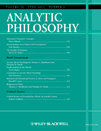
Analytic Philosophy
Innovating Philosophical Inquiry for Today's ThinkersAnalytic Philosophy is a prestigious journal published by Wiley, dedicated to advancing critical discourse in the realm of philosophy. With an ISSN of 2153-9596 and an E-ISSN of 2153-960X, this journal has rapidly established itself as a vital resource for researchers, professionals, and students seeking to explore contemporary philosophical debates and analytic methods. Operating from the heart of the United States, located at 111 River St, Hoboken, NJ, it holds an impressive Q1 classification in the field of philosophy for 2023, ranking #190 out of 806 within Scopus's Arts and Humanities category, placing it in the top 76th percentile. The journal’s commitment to rigor and innovation makes it an essential platform for thought-provoking research and discussions in analytic philosophy. Researchers will appreciate the journal’s high standards and its significant impact within the academic community.

Logica Universalis
Bridging Theory and Practice in Mathematical LogicLogica Universalis is an esteemed academic journal published by SPRINGER BASEL AG, dedicated to advancing the fields of Applied Mathematics and Logic. With its ISSN 1661-8297 and E-ISSN 1661-8300, the journal has been active from 2007 and continues to contribute significantly to the discourse surrounding mathematical logic and its applications up to 2024. Located in Basel, Switzerland, Logica Universalis holds a notable position within the academic community, evidenced by its ranking within the Q4 category of both Applied Mathematics and Logic as of 2023. While it currently operates without Open Access options, the journal remains a pivotal resource for researchers and practitioners seeking to explore foundational and applied aspects of logic. Moreover, with a Scopus rank of #22/41 in Logic and #464/635 in Applied Mathematics, it provides a platform for comprehensive knowledge dissemination and facilitates innovative research that bridges theoretical and practical methodologies. This journal is instrumental for anyone looking to deepen their understanding and make meaningful contributions to these intertwined domains.

Australasian Journal of Logic
Fostering collaboration in the realm of logic.The Australasian Journal of Logic is a prominent scholarly publication in the field of logic, published by the Australasian Association for Logic. With an ISSN of 1448-5052, this journal serves as a vital platform for disseminating research that advances the understanding and application of logical theory and its intersection with various disciplines. Although it is not open access, its rigorously peer-reviewed articles cater to academics, researchers, and students keen on exploring contemporary issues in logic both in theoretical and practical domains. The journal aims to foster scholarly communication and collaboration within the logic community, encouraging the exchange of ideas and insights that shape the future of logical studies. By contributing to the growing body of knowledge in this essential field, the Australasian Journal of Logic plays a crucial role in enhancing the intellectual landscape of logic research.